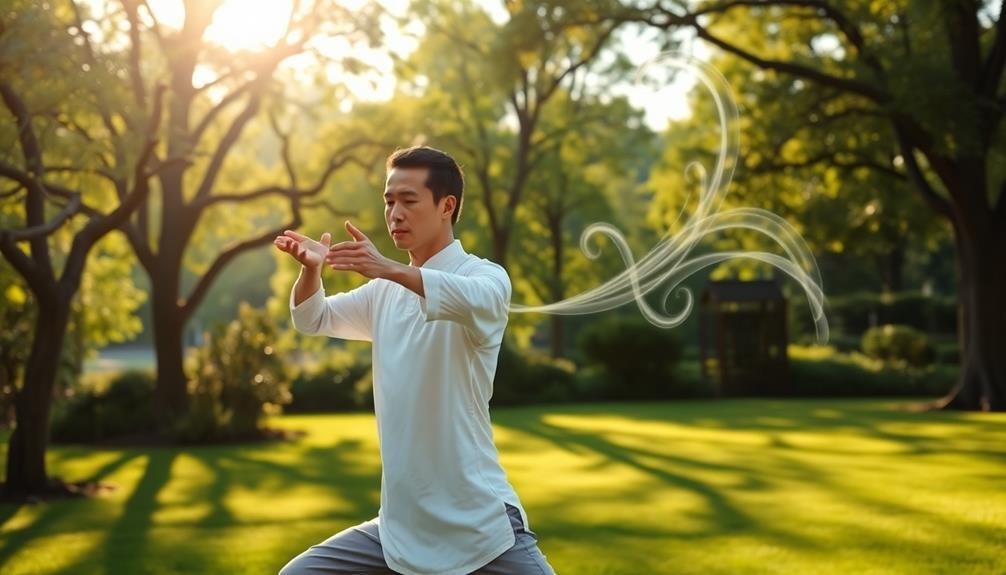Qigong energy practices ease anxious thoughts by combining gentle movements, breath control, and meditation to balance your body's energy. You'll learn to regulate your nervous system through specific breathing techniques, promoting calmness and reducing worry. As you practice, you'll develop greater body awareness, allowing you to identify and release physical tension associated with anxiety. Qigong also unblocks stagnant energy pathways, enhancing emotional resilience and mental clarity. By cultivating present-moment awareness and using visualization techniques, you'll quiet mental chatter and foster inner stillness. Incorporating Qigong into your daily routine can lead to long-term benefits for your mental well-being. Discover how this ancient practice can transform your relationship with anxiety.
Understanding Qigong and Anxiety

Qigong, an ancient Chinese practice combining gentle movements, breath control, and meditation, has gained attention for its potential to alleviate anxiety. This holistic approach to wellness focuses on balancing your body's energy, or "qi," to promote physical and mental well-being.
Anxiety, characterized by persistent worry and fear, can disrupt your daily life and overall health. It's often accompanied by physical symptoms like rapid heartbeat, shortness of breath, and muscle tension. Qigong addresses these issues by targeting both the mind and body simultaneously.
When you practice Qigong, you're engaging in slow, deliberate movements that help calm your nervous system. The controlled breathing techniques used in Qigong can lower your heart rate and reduce stress hormones.
Additionally, the meditative aspects of the practice encourage mindfulness, helping you stay present and break the cycle of anxious thoughts.
Qigong's emphasis on body awareness can also help you recognize and address physical tension associated with anxiety. By learning to relax your muscles and improve your posture, you're creating a more resilient physical state that's less susceptible to stress and anxiety.
Breath Control for Mental Calm
Breath control's power in Qigong can't be overstated when it comes to calming anxious thoughts. By focusing on your breath, you're able to shift your attention away from worrying and into the present moment.
Qigong teaches specific breathing techniques that help regulate your nervous system, reducing the physical symptoms of anxiety.
One key technique is diaphragmatic breathing, where you'll inhale deeply into your belly rather than your chest. This activates your body's relaxation response, lowering heart rate and blood pressure.
Another method is counted breathing, where you'll inhale for a count of four, hold for seven, and exhale for eight. This pattern helps break the cycle of anxious thoughts by occupying your mind with a specific task.
You'll also learn to coordinate your breath with gentle movements, creating a moving meditation that further enhances calm.
As you practice, you'll develop greater awareness of your breath throughout the day, giving you a powerful tool to manage anxiety in real-time.
Body Awareness and Tension Release

Tuning into your body forms an essential part of Qigong practice for managing anxious thoughts. As you engage in Qigong movements, you'll develop a heightened awareness of physical sensations, allowing you to identify areas of tension and stress. This increased body awareness helps you recognize the physical manifestations of anxiety, such as tightness in your chest or shoulders.
Through gentle, flowing movements and focused attention, Qigong encourages you to release tension systematically. You'll learn to consciously relax different muscle groups, promoting a sense of overall ease and calm. This practice of tension release extends beyond your Qigong sessions, enabling you to quickly identify and address physical stress in daily life.
Moreover, Qigong's emphasis on body awareness helps you stay grounded in the present moment. By focusing on physical sensations, you're less likely to get caught up in anxious thoughts about the future or ruminations about the past.
This present-moment awareness, combined with the physical release of tension, creates a powerful tool for managing anxiety. You'll find that regular practice enhances your ability to maintain a calm, centered state even in challenging situations.
Energy Flow and Emotional Balance
Qigong practices focus on unblocking stagnant energy pathways in your body, which can alleviate anxious thoughts.
You'll learn to identify areas of tension and consciously direct energy flow to restore balance.
Unblocking Stagnant Energy Pathways
Three key energy pathways in the body can become blocked, leading to anxiety and emotional imbalance. These pathways are the central, governing, and conception vessels. When you practice Qigong, you're working to unblock these channels and restore the free flow of energy throughout your body.
To unblock the central vessel, which runs through the center of your body, focus on deep abdominal breathing and gentle spinal twists. This helps release tension and promotes a sense of grounding.
For the governing vessel, which runs along your spine, try gentle neck rolls and shoulder shrugs to ease tension in the upper body.
The conception vessel, running along the front of your body, can be unblocked through gentle chest-opening exercises and forward bends.
As you practice these movements, visualize energy flowing smoothly through each pathway. You'll likely notice a reduction in anxious thoughts as your energy becomes more balanced.
Harmonizing Mind-Body Connection
As you explore deeper into Qigong practice, you'll discover its profound ability to harmonize the mind-body connection. This ancient Chinese practice focuses on aligning your physical movements with your breath and mental focus, creating a seamless flow of energy throughout your body.
By engaging in Qigong exercises, you're actively promoting the balance between your mind and body. The slow, deliberate movements help you become more aware of your physical sensations, while the meditative aspects calm your racing thoughts. This heightened awareness allows you to identify areas of tension or emotional blockages within your body.
As you practice, you'll notice how your emotional state affects your physical body and vice versa. Qigong teaches you to channel your energy effectively, redirecting negative emotions into positive, healing energy. This process helps you develop emotional resilience and a greater sense of inner peace.
The harmonization of your mind and body through Qigong leads to improved overall well-being. You'll experience reduced anxiety, better stress management, and increased emotional stability.
Mindfulness in Qigong Practice

In Qigong practice, you'll find powerful techniques for cultivating present-moment awareness.
By focusing on your breath, body sensations, and energy flow, you're training your mind to stay anchored in the now.
These mindfulness practices help quiet the mental chatter, allowing you to develop a sense of inner stillness that can counteract anxious thoughts.
Present-Moment Awareness Techniques
Present-moment awareness lies at the heart of Qigong practice for managing anxious thoughts. When you engage in Qigong exercises, you're encouraged to focus your attention on the here and now, rather than dwelling on past regrets or future worries. This shift in focus helps break the cycle of anxious thinking by anchoring your mind to the present moment.
One effective technique is body scanning, where you systematically direct your attention to different parts of your body, noticing sensations without judgment. This practice heightens your awareness of physical sensations and helps you reconnect with your body.
Another powerful method is breath awareness, where you concentrate on the rhythm and sensation of your breath. By focusing on your breathing, you create a natural anchor for your attention, making it easier to let go of anxious thoughts.
Qigong also incorporates mindful movement, where you perform slow, deliberate motions while maintaining awareness of your body's position and sensations. This combination of movement and mindfulness helps you stay grounded in the present, reducing the mental space available for anxiety to take hold.
Cultivating Mental Stillness
Mental stillness forms the cornerstone of mindfulness in Qigong practice. As you engage in Qigong exercises, you'll learn to quiet your mind and focus on the present moment. This mental calm allows you to observe your thoughts without judgment, reducing the power of anxious ruminations.
To cultivate mental stillness, start by focusing on your breath. Notice the sensation of air entering and leaving your body. When thoughts arise, acknowledge them without attachment and gently return your attention to your breath. As you progress, you'll find it easier to maintain this state of calm awareness.
Incorporate visualization techniques to enhance mental stillness. Imagine a peaceful scene or envision negative thoughts floating away like clouds. These mental images can help anchor your mind in the present and promote a sense of tranquility.
Regular practice of Qigong movements, combined with mindfulness techniques, will strengthen your ability to maintain mental stillness. You'll develop a heightened awareness of your body and mind, allowing you to recognize and release tension more easily.
This increased self-awareness can greatly reduce anxiety and promote overall well-being.
Incorporating Qigong Into Daily Life
Incorporating Qigong into your daily routine doesn't have to be complicated or time-consuming. Start small by dedicating just 5-10 minutes each morning or evening to practice simple Qigong exercises. You can easily integrate these gentle movements and breathing techniques into your existing schedule, making it a sustainable habit.
To seamlessly blend Qigong into your daily life, consider these strategies:
- Set a specific time for practice, such as right after waking up or before bed
- Use reminders on your phone or sticky notes to prompt your Qigong sessions
- Perform brief exercises during work breaks or while waiting in line
- Combine Qigong with other activities, like walking or stretching
As you become more comfortable with the practice, gradually increase your session duration and frequency.
You'll find that Qigong's benefits extend beyond the practice itself, influencing your overall mindset and approach to daily challenges. By consistently incorporating Qigong into your routine, you'll develop a greater sense of calm, improved focus, and enhanced ability to manage anxious thoughts throughout your day.
Frequently Asked Questions
How Long Does It Take to See Results From Practicing Qigong?
You'll likely notice subtle changes within a few weeks of consistent qigong practice. However, significant results may take 2-3 months. Stick with it daily, and you'll experience improvements in your physical and mental well-being over time.
Can Qigong Be Practiced Alongside Other Forms of Anxiety Treatment?
Yes, you can practice qigong alongside other anxiety treatments. It's often complementary to therapy, medication, or lifestyle changes. You'll likely find that qigong enhances your overall anxiety management strategy, providing additional tools for relaxation and mindfulness.
Are There Any Potential Side Effects or Risks of Qigong Practice?
You'll find qigong is generally safe, but you might experience minor side effects like dizziness or muscle soreness. If you've got pre-existing health conditions, it's best to consult your doctor before starting. Always practice under proper guidance.
What's the Difference Between Qigong and Other Meditation Practices?
You'll find qigong combines gentle movements with breath and meditation, while other practices may focus solely on stillness. Qigong emphasizes energy cultivation and physical health, but many meditation techniques primarily target mental clarity and mindfulness.
Is Qigong Suitable for People With Physical Limitations or Disabilities?
Yes, qigong is suitable for people with physical limitations or disabilities. You can adapt many exercises to your abilities, performing them seated or even lying down. It's a gentle practice that focuses on breathing and mindfulness, accommodating various needs.
In Summary
You've learned how qigong can help ease your anxious thoughts through breath control, body awareness, energy flow, and mindfulness. By incorporating these practices into your daily life, you'll develop powerful tools to manage stress and find inner calm. Remember, consistency is key. Even a few minutes of qigong each day can make a significant difference. Start small, be patient with yourself, and watch as your anxiety levels decrease and your overall well-being improves.





Leave a Reply